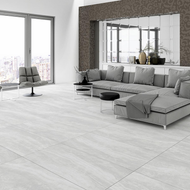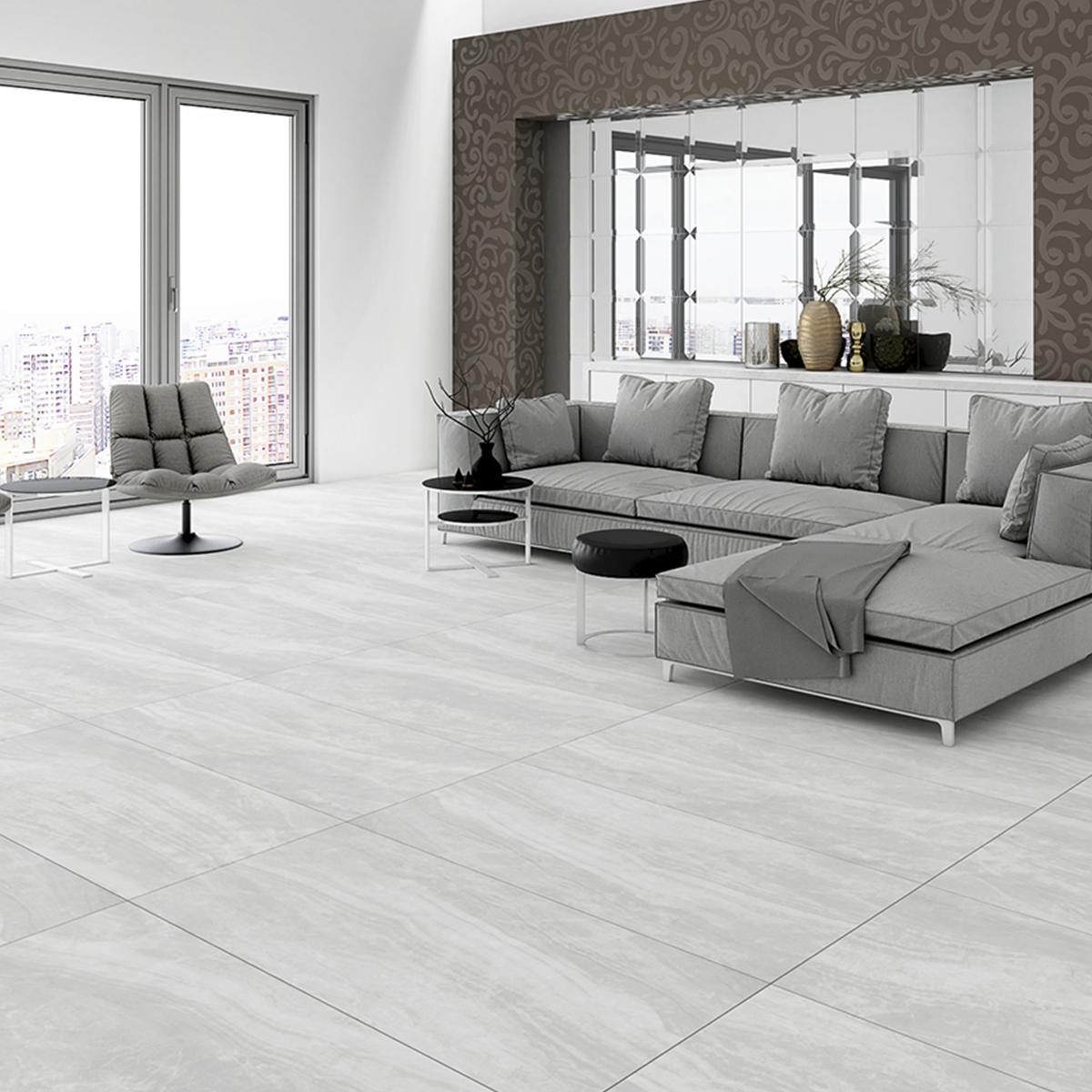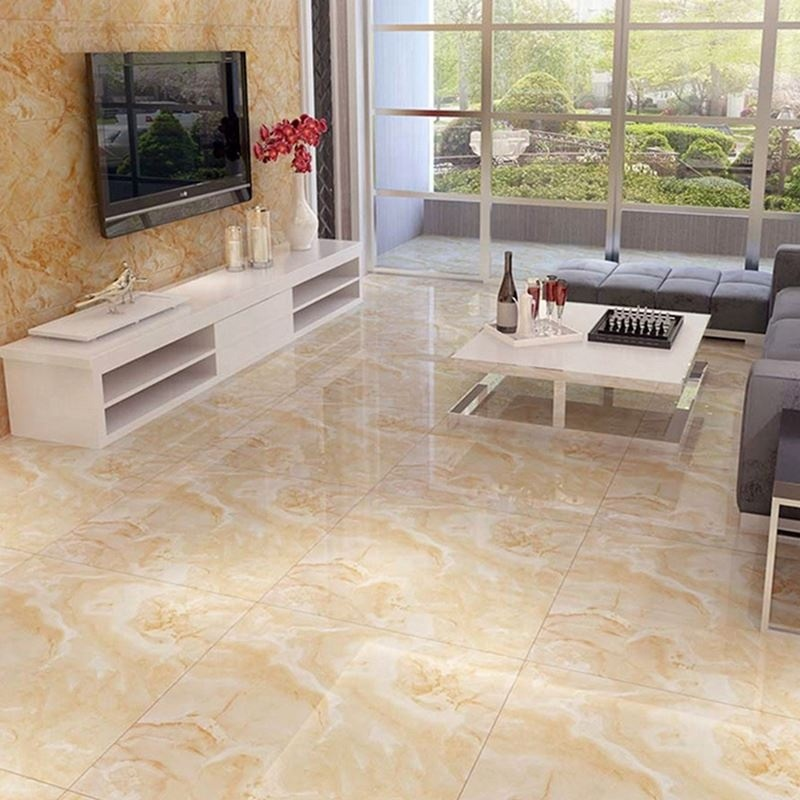THE BENEFITS OF PORCELAIN TILE
Posted by Mike Belk on Sep 09, 2020


When building a new house or renovating, you might wonder what material to use for flooring? There are a lot of options, and one of the most popular will be ceramic or porcelain tiles. These are a great way to make indoor and outdoor flooring on a budget.
Porcelain tile is a new type of ceramic tile made from thin, dense clay. These tiles are more rigid, more resistant to scratches and stains, and more durable than other types of tiles. It maintains its shape easily during heavy traffic in residential and commercial environments. Today, tiles made from porcelain are becoming an increasingly popular option for flooring.
PORCELAIN TILE APPLICATIONS
Porcelain is a type of ceramic tile that is characterized by its strength, hardness, purity, and water resistance compared to ordinary ceramic, which is already very resistant. It uses more refined particle clays, fired at a higher temperature, which creates a more rigid glass surface than that usually obtained with standard ceramic tiles. This inherent versatility gives ceramic tiles the ability to bring many benefits to various architectural coatings applications. However, as with all flooring options, there are advantages and disadvantages to using it.
When you want to install glazed tiles outdoors, it is recommended to ensure that they are non-slip to prevent any risk of accident in rain or ice. Thanks to the more significant proportion of joints, small-format tiles are more slip-resistant than large formats. For underfloor heating, there is hardly any better coating than tiling because it has good thermal conductivity. Many of the above properties make the tiles particularly attractive from an economic point of view for wall and floor coverings. Their great longevity, in particular, makes it possible to quickly make a return on this investment, which initially seems high.
Tiles come in many different materials for walls and floors. You can lay them on the bathroom floor, kitchens, or even outside areas. Due to its unique properties, porcelain is particularly suitable for tiles. You can find out below which advantages porcelain mosaic tiles offer.
THE ADVANTAGES OF PORCELAIN TILES
High Wear Resistance
Porcelain tiles can be used anywhere due to their excellent and durable surface. However, any flooring can deteriorate over time. On the other hand, porcelain is highly wear-resistant and retains its appearance much longer than other types of flooring. Porcelain tiles are highly resistant to scratches, stains, fading, and more.
Low maintenance
The maintenance of porcelain tiles is painless and does not require any seals for water resistance. It is easy to remove stains from tiles, usually with water and a little detergent (if necessary). Porcelain floor tiles will look great for years to come with little effort. Porcelain’s natural stain and water resistance also help make the material very easy to wash off and maintain. You can clean up the spills locally with a damp cloth if necessary, and regular sweeping will prevent debris from settling on the floor, helping to keep any glass surface guards in place if necessary. Periodic wet scrubbing with a pH balanced dish soap solution helps sanitize the area.
Styling
Porcelain tiles have limitless styles and can look like granite, slate, marble, wood, or limestone, depending on your choice.
Durability
One of the main advantages of tiles is durability. It is much denser than standard porcelain stoneware because it is fired at higher temperatures and made from a more refined clay. Porcelain tiles, if properly installed, will look like new over time. These are some of the more difficult flooring options available. The hard, dense, and robust porcelain withstands most impact stresses and can even be used in commercial environments. As a general rule, this material should have a PEI rating of at least 5, which makes it suitable for high-traffic spaces and the use of heavy equipment.
Moisture
Porcelain tiles are less susceptible to moisture and are especially useful in cold climates because they do not crack in the cold.
Cleaning
Another advantage of porcelain tiles to ceramic granite is that it is pretty easy to clean and maintain them. You can wash it with plain water with the addition (if necessary) of detergent. Another option is to mix some vinegar with warm water, and your surface will be clean and sanitized. The tile is highly slip-resistant. It can be used either indoors or outdoors. Hot water and a rag are often enough to clean these tiles effectively. No smelly chemicals are required to clean up the dirt.
The Service Life
Ceramic and porcelain tiles are much more durable than carpet or wood flooring. These latter options require constant maintenance and must be replaced periodically. Properly installed porcelain will serve the owner and his family for a lifetime. It reduces the periodic costs of removal and replacement.
Indoor Air
Carpet, vinyl, and wood flooring materials can cause odors by releasing volatiles into the air. They do not always have a beneficial effect on people’s health, and the owner of the house and his family have to breathe such air. These troubles can be avoided by using porcelain tiles, which, during the manufacturing process, are fired in an oven at more than 800 degrees Celsius. With such heating, all volatile organic compounds contained in the material are destroyed, and ceramics acquire their environmental friendliness.
Local Manufacturing
There are manufacturers of modern ceramic tiles across the US that produce ceramic tile options, both for walls and floors, from local raw materials. It is in stark contrast to suppliers of vinyl, carpet tiles, who have to ship products for sale from other regions and countries. The support of a local manufacturer will be an essential factor when choosing ceramic tiles.
Allergens
The tiles are not conducive to the growth of bacteria and mold. If you or your family members suffer from allergies, replacing carpeting with porcelain options will improve breathing and reduce allergies.
Design flexibility
Modern porcelain tiles can mimic all kinds of traditional flooring very well, such as marble, granite, wood, steel, bamboo, or cork. Visually, it is almost impossible to distinguish them.
Liquid resistance
The density of porcelain makes it more resistant to the penetration of liquids than other types of more porous ceramic. This advantage can be increased by the application of molten glass enamel, which will make any adherent surface entirely impermeable for water.
Stain Resistance
The stain-resistant properties of porcelain tiles give them an edge over other materials. These tiles don’t only repel liquid penetration, but also prevents colors from penetrating and staining the tiles. The glazing process further enhances this property, making it nearly impossible for the surface of these tiles to fade.
Fire Resistance
Porcelain does not burn under normal conditions, and these floors can help limit flame transfer and movement in the event of a fire.
Repairable
These materials tend to resist cracking and rupture by physical impact. However, if a tile is damaged, it is easy to remove and replace a porcelain piece. It is a good idea to save an additional box or two of the products during installation to facilitate color matching.
Resists Static Electricity
Unlike other coatings, they do not become charged with static electricity during friction caused by walking. It prevents getting electric shocks when touching the sink faucet. Besides the hygienic advantages, the antistatic property is one reason why special electrically conductive tiles are fitted in operating theatres in hospitals.
Light-Resistant and Fade-Resistant
When you think about how important colors are in creating the harmony of a room, this property is a significant factor when choosing a ceramic coating.
Scratch Resistant
You will have to have a vivid imagination if you ever thought of wanting to scratch a sandstone tile. Even stiletto heels are safe for glazed tiles as they resist pressure.

The Magic is in the Production
Porcelain tiles have a low level of water absorption and are incredibly durable. It is due to the combination of special clays and high kiln temperatures used in the production process. Together, these materials and the firing process create a dense and durable tile.
The process begins with the preparation of the clay mixture and the main components, consisting of small particles of feldspar or silicon, and silicon dioxide. This raw material is crushed using a crusher and a hammer mill.
The main mixture of clay and minerals is mixed with water and poured into a large and rotating mill cylinder. Here the materials are ground into a single and homogeneous material. Now the moisture from the resulting mixture is evaporated using a dryer. The mixture of liquid clay is placed into molds in a hydraulic press, where the tile is formed under pressure. Then the process of firing the future porcelain tiles begins. It is initially heated at a relatively low temperature to reduce moisture content. Then the final high-temperature firing process takes place.
The tile goes through the glazing process. Different types of glaze are applied to the tile surface here, depending on the type of porcelain tile. Glazing takes place within 45 minutes at a temperature of 2372 degrees Fahrenheit. At this point, the glaze is bonded to the tile surface. Moreover, it is a critical process that makes the tiles very tough and impact-resistant. The high-temperature treatment ensures a high percentage of solids in the tiles.
DISADVANTAGES OF PORCELAIN TILES:
Density
One of the disadvantages of porcelain tiles is their density – they are too hard and difficult to cut.
Weight Porcelain tiles are heavy and require some effort to install.
However, these drawbacks are not a problem as long as you hire a professional tiler and have all the necessary tools ready for installation. Porcelain is a fantastic and highly durable product that will make the perfect floor surface. Porcelain tiles are of exceptionally high quality, so dense that they can be polished with unique polishing stones with high finishing.
TYPES OF PORCELAIN TILES
Common porcelain tiles
These are used in very high traffic areas or areas where anti-slip properties are essential. They can be made in a matte or textured design.
Glazed porcelain
The most popular are glazed porcelain tiles, made using a decorative and super wear-resistant glaze (matte or glossy) over a porcelain base.
Polished porcelain
Polished porcelain is just ordinary porcelain that has been polished. With all the pros and cons of porcelain tiles, they are the perfect choice for some areas of the home. Thanks to its durability, you won’t have to replace it anytime soon.
PORCELAIN OR CERAMIC: HOW TO CHOOSE?
Porcelain is just a form of pottery. The main difference is that porcelain is fired at significantly higher temperatures. That makes it denser and less able to absorb water. These parameters influence the use of porcelain as an interior or exterior substrate due to its extreme durability and strength. Porcelain is also a popular flooring material in shower stalls as it does not absorb as much water as ceramics.
Ceramic tiles are cheaper than porcelain. It is trendy as an indoor flooring material, but not recommended for outdoor use due to water absorption.
Conclusion
Porcelain is among the best solutions for interior design, as it has all the benefits from beauty to durability. Apart from the professional installation that it requires, there isn’t a single disadvantage of these tiles at the user’s end. Tile glazes are so hard they don’t mind even the most pointed heels. Porcelain tiles that resist frost are the ideal coating for balconies and terraces. If you plan to install glazed tiles outdoors, make sure that they are slip-resistant to prevent the risk of accidents when it is slippery and wet. Small-format tiles support the non-slip character due to their higher joint proportion. For underfloor heating to work well, there is hardly a better floor covering than tiles that have good thermal conductivity. Many of the properties mentioned above make porcelain tiles a superb wall and floor covering from an ecological and economic point of view. Thanks to their longevity, the investments, which initially appear high, pay for themselves after a short time.



